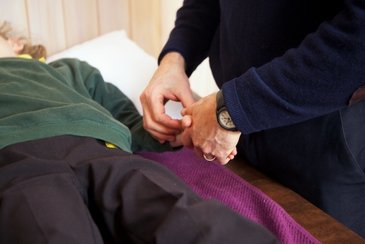
What is acupuncture?
Acupuncture is a safe and effective practice, which can be used alongside conventional medicine. Some people turn to acupuncture for help with a specific symptom or condition. Others choose to have treatment to help maintain good health, as a preventive measure, or simply to improve their general sense of wellbeing.
Because traditional acupuncture aims to treat the whole person rather than specific symptoms in isolation, it can be effective for a range of conditions. This also means that each patient’s treatment plan will be different. However, you can always ask your practitioner about other patients’ experiences, to give you an idea of what to expect. Many people return to acupuncture again and again because they find it so beneficial and relaxing.
In 2009 the National Institute for Health and Clinical Excellence (NICE) recommended that acupuncture should be made available on the NHS, as a cost-effective short-term treatment for the management of early, persistent non-specific lower back pain. In 2012 NICE endorsed acupuncture for the prophylactic treatment of migraine and tension headache.
How does it work?
Traditional acupuncture is an ancient Chinese system of healing which may help a person to achieve a more balanced physical and emotional state. Its philosophy is that in good health there is a continuous smooth flow of energy (Qi or Chi) through channels within the body. Illnesses, injury or emotional stress can disturb the smooth flow of Qi, leading to a range of symptoms and often the loss of a sense of well-being. The acupuncturist aims to balance the flow of Qi by inserting fine needles into specific points on the body. A person receiving acupuncture will often report both an improvement in symptoms and an increased sense of well-being
Is there any research?
Yes. The Acupuncture Research Resource Centre (ARRC) provides a specialist resource for acupuncture research It was set up by the British Acupuncture Council in 1994 to:
You can look at summaries of the evidence for acupuncture in treating different conditions here British Acupuncture Council/Research/Fact Sheets
What do other experts say?
The World Health Organisation has produced a report which lists a wide variety of diseases and disorders for which acupuncture therapy has been tested in controlled clinical trials. Follow this link: http://apps.who.int/medicinedocs/en/d/Js4926e/5.html
Further information
If you would like to know more about acupuncture please visit the website of the British Acupuncture Council www.acupuncture.org.uk or if you have a specific question email [email protected].
Acupuncture is a safe and effective practice, which can be used alongside conventional medicine. Some people turn to acupuncture for help with a specific symptom or condition. Others choose to have treatment to help maintain good health, as a preventive measure, or simply to improve their general sense of wellbeing.
Because traditional acupuncture aims to treat the whole person rather than specific symptoms in isolation, it can be effective for a range of conditions. This also means that each patient’s treatment plan will be different. However, you can always ask your practitioner about other patients’ experiences, to give you an idea of what to expect. Many people return to acupuncture again and again because they find it so beneficial and relaxing.
In 2009 the National Institute for Health and Clinical Excellence (NICE) recommended that acupuncture should be made available on the NHS, as a cost-effective short-term treatment for the management of early, persistent non-specific lower back pain. In 2012 NICE endorsed acupuncture for the prophylactic treatment of migraine and tension headache.
How does it work?
Traditional acupuncture is an ancient Chinese system of healing which may help a person to achieve a more balanced physical and emotional state. Its philosophy is that in good health there is a continuous smooth flow of energy (Qi or Chi) through channels within the body. Illnesses, injury or emotional stress can disturb the smooth flow of Qi, leading to a range of symptoms and often the loss of a sense of well-being. The acupuncturist aims to balance the flow of Qi by inserting fine needles into specific points on the body. A person receiving acupuncture will often report both an improvement in symptoms and an increased sense of well-being
Is there any research?
Yes. The Acupuncture Research Resource Centre (ARRC) provides a specialist resource for acupuncture research It was set up by the British Acupuncture Council in 1994 to:
- improve the evidence base and demonstrate the value of traditional acupuncture
- collect acupuncture research data from available sources
- develop and apply research methods that are suited to investigating traditional acupuncture
- increase awareness of the effectiveness of traditional acupuncture by providing good quality information to practitioners, other health service providers, journalists, researchers, government bodies and the public.
You can look at summaries of the evidence for acupuncture in treating different conditions here British Acupuncture Council/Research/Fact Sheets
What do other experts say?
The World Health Organisation has produced a report which lists a wide variety of diseases and disorders for which acupuncture therapy has been tested in controlled clinical trials. Follow this link: http://apps.who.int/medicinedocs/en/d/Js4926e/5.html
Further information
If you would like to know more about acupuncture please visit the website of the British Acupuncture Council www.acupuncture.org.uk or if you have a specific question email [email protected].